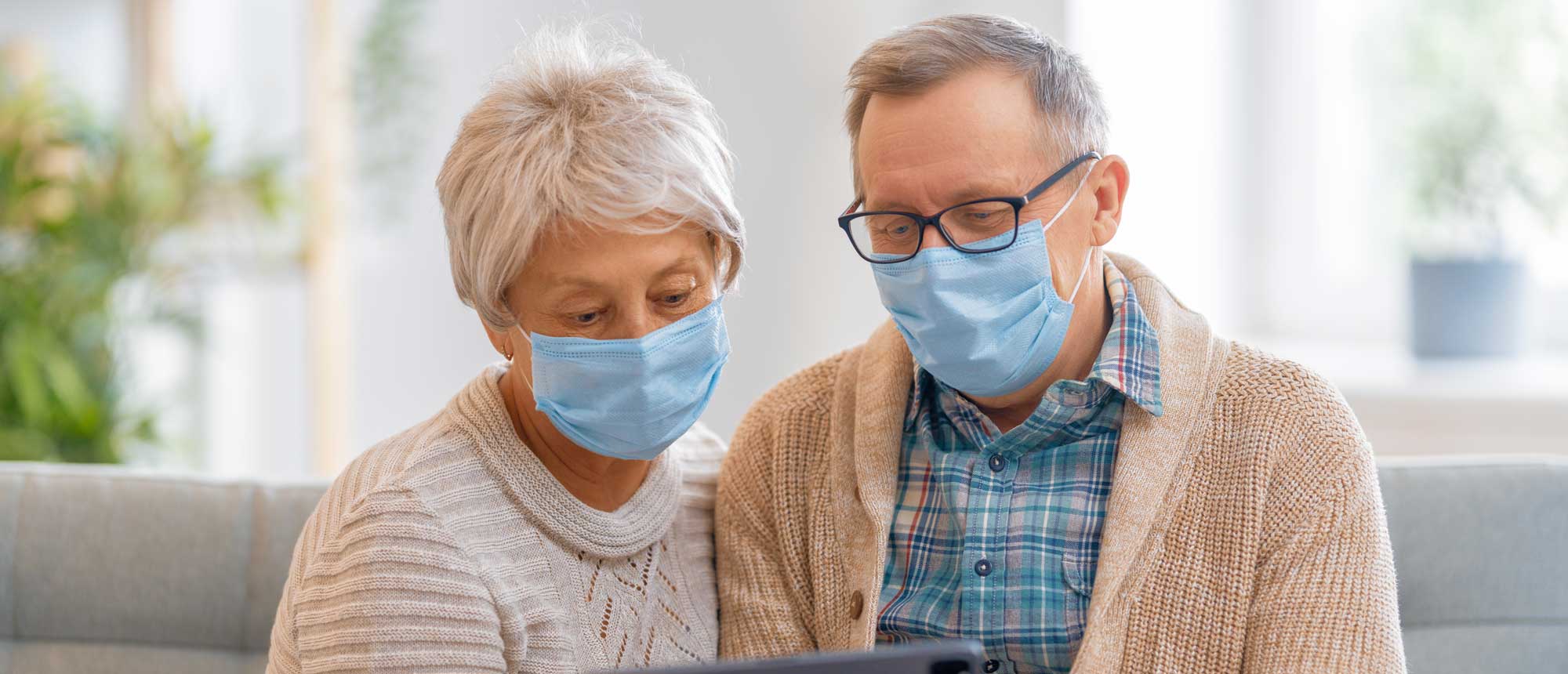15 Jul Helping Seniors and Their Caregivers Stay Safe | Family Tree In-Home Care
In this era of COVID-19, we have all become familiar with the general recommendations for staying safe. These include frequently washing our hands, practicing social distancing, and not touching our faces. These are all prudent actions that we must continue. However, there are additional precautions we can take to further safeguard our health as we continue through this crisis. These suggestions are especially important for seniors or those who are immunocompromised because they are at greater risk of contracting an illness.

Healthcare provider examining a senior patient in a face mask.
If you are a caregiver for an older adult, taking extra steps to preserve your well-being is also suggested as the demands of caregiving can lower your immune response.
Below are some measures that you can add to your existing routine, which will benefit those in your care and yourself.
Illness Precautions for Seniors & Their Caregivers
Implementing actions that bolster the immune system are advantageous for yourself as well as seniors.
- Physical activity – Getting regular exercise is a great way to boost your immune system, and it can reduce the risk of catching a cold by 33%.
- Sanitize frequently touched objects – Make a practice of regularly sanitizing items such as electronic devices, doorknobs, and light switches.
- Stay hydrated – Drinking plenty of fluids is essential. Beverages such as hot tea and water keep nasal passages moist and deter germs from entering the body. Older adults have significantly less water in their bodies, so dehydration can occur more quickly.
- Eat immune-boosting foods – A well-balanced diet that includes protein such as fish, eggs, or yogurt is another way to increase your immunity. Plus, it turns out that your mother was right. Chicken soup is not only delicious; it also packs infection-fighting power and throat-soothing properties!
- Get a flu vaccine – Getting a flu shot each year can protect you against contracting influenza.
Caring for an Elderly Loved One Who is Sick
Sometimes we may get sick even after taking steps to avoid becoming ill. If you or a senior loved one starts to develop symptoms, make sure you see a doctor and take any medications as prescribed. Especially for seniors, it is imperative to seek treatment as soon as possible to prevent an illness from becoming more severe or possibly even deadly. Many physicians are now offering telemedicine so you can safely receive treatment from your home. If a senior you are caring for does become ill, here are some ways you can help.
- Ensure proper sleep – Getting adequate sleep is vital for overall health. When a person is sick, sometimes sleeping becomes more difficult. Consider propping your loved one up at a 45-degree angle when in bed so that nasal fluid can properly drain and decrease the chances for infection.
- Maintain social distancing – Try to spend most of your time in a separate room from the sick person, at least initially when he is most contagious. You can still care for the ill person by supplying them with the essentials like medication, tissues, and food.
- Keep the environment sufficiently ventilated – Direct air from an open window blowing on an older adult who is sick is not a good idea, but opening other windows in the house are useful. This will allow fresh air to circulate freely through the house while moving germs out.
- Continue healthy eating and drinking habits – Even though appetite may be diminished when sick, it is still recommended that persons who are ill continue to fuel their bodies with nutritious foods and drink plenty of water.
Understanding Illness Symptoms
As mentioned above, if you or a senior becomes ill, visiting the doctor is necessary. But as a patient, it is wise to understand your symptoms so you can give your physician all the essential information. Then, she can make the proper diagnosis.
Cold vs. Flu
The common cold and flu have some of the same symptoms. Still, adults in general, and seniors specifically may not exhibit all the same symptoms as children.
Cold
Cold symptoms are generally milder than those of the flu. Below are some common symptoms of a cold:
- Runny nose
- Stuffy nose
- Sneezing
- Congestion
- Sore throat
Flu
Some symptoms mentioned above that are present with a cold may also be seen in someone with the flu such as a runny or stuffy nose, and a sore throat. In addition, there are other signs of the flu:
- Fever or chills (although seniors may not experience fever)
- Sore throat
- Muscle or body aches
- Headache
- Fatigue
- Vomiting and diarrhea (more frequently seen in children)
Learn More About Keeping Seniors and Their Caregivers Safe
At Family Tree In-Home Care, we are dedicated to providing you and your family with outstanding care during this COVID-19 crisis. Contact us to learn more about our in-home care solutions and methods for keeping your loved one safe.


